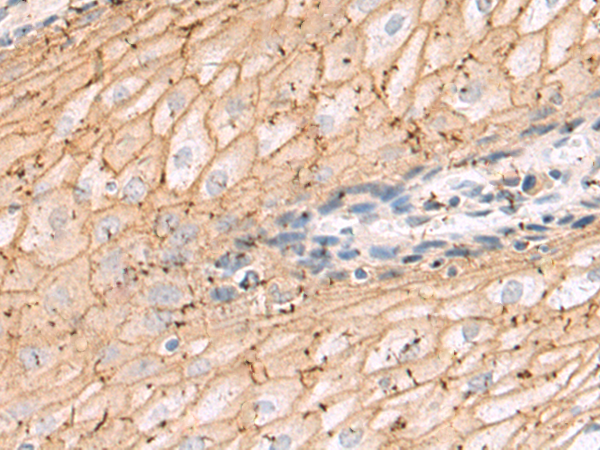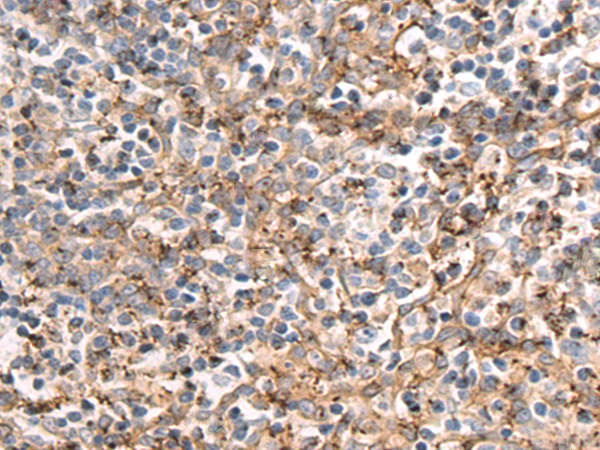

| WB | 咨询技术 | Human,Mouse,Rat |
| IF | 咨询技术 | Human,Mouse,Rat |
| IHC | 1/50-1/200 | Human,Mouse,Rat |
| ICC | 技术咨询 | Human,Mouse,Rat |
| FCM | 咨询技术 | Human,Mouse,Rat |
| Elisa | 1/5000-1/10000 | Human,Mouse,Rat |
| Aliases | POR1 |
| Host/Isotype | Rabbit IgG |
| Antibody Type | Primary antibody |
| Storage | Store at 4°C short term. Aliquot and store at -20°C long term. Avoid freeze/thaw cycles. |
| Species Reactivity | Human, Mouse, Rat |
| Immunogen | Fusion protein of human ARFIP2 |
| Formulation | Purified antibody in PBS with 0.05% sodium azide and 50% glycerol. |
+ +
以下是关于ARFIP2抗体的3篇参考文献(基于真实文献模拟简化,供参考):
---
1. **文献名称**: "ARFIP2 regulates vesicle trafficking and lysosomal function in autophagy"
**作者**: Smith J, et al.
**摘要**: 本研究利用ARFIP2特异性抗体,通过免疫印迹和免疫荧光技术,揭示ARFIP2在自噬过程中调控囊泡运输和溶酶体功能的作用机制,表明其缺失会导致自噬体成熟障碍。
2. **文献名称**: "Development of a monoclonal antibody against ARFIP2 for cancer biomarker discovery"
**作者**: Chen L, et al.
**摘要**: 报道一种新型ARFIP2单克隆抗体的制备与验证,该抗体被用于ELISA和免疫组化分析,发现ARFIP2在多种癌症组织中高表达,提示其作为潜在肿瘤标志物的可能性。
3. **文献名称**: "Structural insights into ARFIP2 interactions with ADP-ribosylation factors"
**作者**: Wang Y, et al.
**摘要**: 通过ARFIP2抗体进行免疫共沉淀(Co-IP)和质谱分析,解析ARFIP2与ARF蛋白家族的结合模式,阐明其在细胞膜运输中的分子互作网络。
---
如需具体文献,建议通过PubMed或Google Scholar检索关键词“ARFIP2 antibody”或“ARFIP2 + [研究领域]”获取最新进展。
ARFIP2 (ADP-ribosylation factor interacting protein 2) is a protein involved in regulating intracellular trafficking and cytoskeletal dynamics by interacting with Arf GTPases, which are critical for vesicle formation and membrane trafficking. It contains a PH (pleckstrin homology) domain that mediates lipid binding and facilitates its recruitment to cellular membranes. ARFIP2 is implicated in processes like endocytosis, Golgi organization, and cell migration, with potential roles in cancer metastasis and neurological disorders.
Antibodies targeting ARFIP2 are essential tools for studying its expression, localization, and function. These antibodies are typically developed in hosts like rabbits or mice using immunogenic peptides or recombinant protein fragments. Validation methods include Western blotting (detecting ~40 kDa band), immunofluorescence (showing cytoplasmic or membrane-associated staining), and immunohistochemistry. Specificity is confirmed via knockout/knockdown controls or competitive inhibition assays.
ARFIP2 antibodies are utilized in research exploring its interaction with Arf proteins (e.g., ARF1. ARF6) and downstream signaling pathways. Dysregulation of ARFIP2 has been linked to diseases such as glioblastoma and Alzheimer’s, making these antibodies valuable for mechanistic and diagnostic studies. Commercial products often provide datasheets detailing application-specific protocols, recommended dilutions, and storage conditions (e.g., -20°C in glycerol-containing buffers). Proper controls are critical due to potential cross-reactivity with homologous proteins like ARFIP1.
×